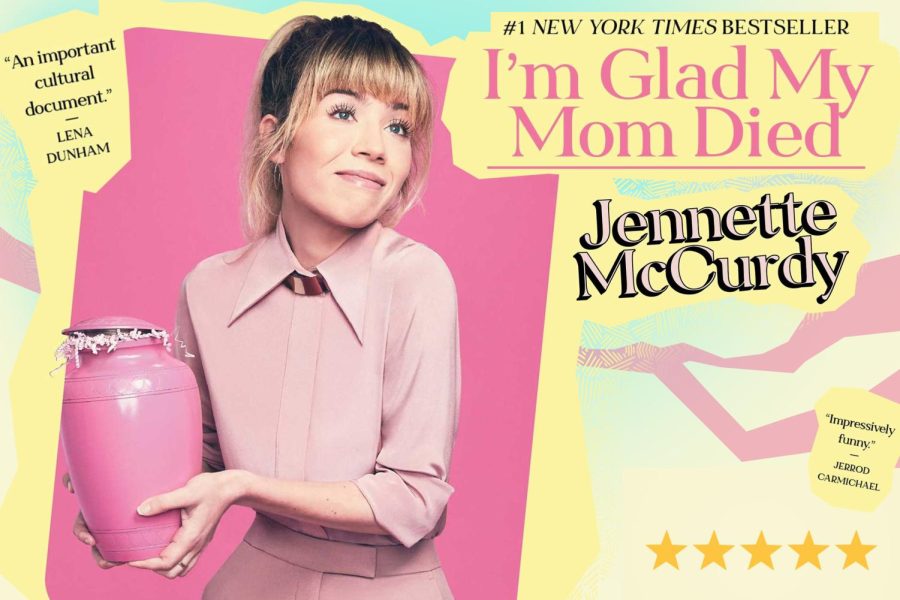Jennette McCurdy’s “I’m Glad My Mom Died”: An essential read
McCurdy’s blunt writing style feels like witnessing a horrific accident; I desperately wanted to look away, but couldn’t.
December 21, 2022
Content warning: This story contains language that pertains to eating disorders and sexual assault.
As I lazily browsed the aisles of Barnes and Noble on a Wednesday afternoon in August, I wasn’t expecting to add another book to my already overgrown to-read list. But nearing the end of my perusal, I saw it: The Holy Grail. The book I had feverishly searched for since it hit shelves in early August — crossing state lines and obsessively checking websites to get my hands on: Jennette McCurdy’s “I’m Glad My Mom Died.”
Many anticipated the book’s release because of the allure and fame of its author. McCurdy co-starred in the hit Nickelodeon show “iCarly” (2007-2012) and its short-lived spinoff, “Sam and Cat” (2013-2014). I grew up on “iCarly” and had long been a fan of McCurdy’s quirky comedic chops. I’d heard reports of mistreatment towards the show’s cast, especially McCurdy, but I never explored it in-depth. That is, until now.
The book follows McCurdy from childhood, and though unusual for a memoir, is written in the present tense. For around 300 pages, the former actress chronicles the most turbulent stages of her life from a position of vulnerability and powerlessness. Readers get an inside look at the subtle hatred growing in her attitudes toward show business, the music industry and her eating habits as she grows up in the public eye. The novel shines as McCurdy explores the basis of its shocking title, unpacking her complex view of her mother, Debra McCurdy.
McCurdy’s naivety to her mother’s abuse is evident at the beginning of the book — marking the beginning of her childhood — as she worships her mother due to her doting attention. Debra lives her life vicariously through her daughter, emotionally abusing Jennette when she merely mentions the prospect of forging her own path. She restricts Jennette’s calorie intake beginning at the age of nine, which sets her on a destructive pattern of eating disorders that plagues her into her 20s. She also bathes her daughter and conducts “checks” of McCurdy’s private areas until she is 16 years old.
McCurdy’s blunt writing style feels like witnessing a horrific accident; I desperately wanted to look away, but couldn’t. Instead, I could only wish for a way to intervene and help Jennette, realize that her mother’s love was slowly stifling and destroying her.
Readers observe as Debra lives her dream of becoming an actress through her daughter, signing her up for acting lessons and auditions. McCurdy assures her mother of how much she loves these things while explaining her misery throughout the process to the reader.
Eventually, producers of “iCarly” cast McCurdy as the beloved Sam Puckett, a quirky, sarcastic character who loves food — an ironic trait, McCurdy explains, considering her complicated relationship with it. The show’s origins were the part of the book I was both looking forward to and dreading the most. Part of me wanted to continue living in ignorance, choosing only to look back on “iCarly” with nostalgia. I didn’t want something that had been such a foundational part of my childhood to be tainted with the tales of the misery caused by those who made the show possible.
But that wouldn’t be fair; ignoring the disturbing truth behind the show I loved so much wouldn’t make them go away. I felt as if I almost owed it to McCurdy, who I had grown up adoring, to understand her true story.
Learning about McCurdy’s mistreatment on “iCarly” and “Sam and Cat” filled me with deep sadness. I read in horror about creator and producer Dan Schneider’s inappropriate attention and touchiness, McCurdy’s consistent denial of her real interest in directing and her mother’s overbearing influence looming over her. The book forever changed my view of “iCarly,” and I had to accept that.
The memoir takes an emotional turn that signifies the beginning of a matured McCurdy when Debra loses her battle to breast cancer in 2013. McCurdy describes how her sorrow led to harrowing alcoholism, and readers watch as her already-deteriorating mental and physical health continues to worsen. However, McCurdy ultimately projects resilience as she chronicles her journey to rise above this pain and emerge stronger than before. Without her mother, she is able to fully focus on herself, and eventually musters the courage to tell her agents that she is done with acting — until she returns for a brief stint years later when she writes and stars in the one-woman show that she later adapted into her memoir. After doing what truly gives her purpose and eventually finding the right therapist, McCurdy discovers that her trauma made her stronger.
Growing up often means letting go of the things we used to love, or even realizing that these things weren’t as beautiful as we once believed them to be. McCurdy’s book taught me this, along with the importance of self-care, and the helpfulness of therapy.
A beautiful and heartbreaking story complete with detailed and unique writing, McCurdy’s heart-wrenching memoir is an essential read for all. “I’m Glad My Mom Died” changes readers’ outlook on the film industry and the impact of abuse and eating disorders, providing an inspirational assurance that it’s possible to overcome trauma and even make the best of it.








